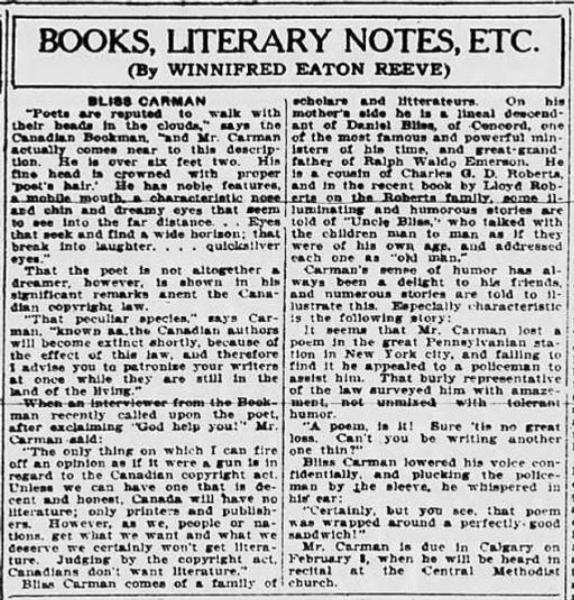Bliss Carman
“Poets are reputed to walk with their heads in the clouds,” says the Canadian
Bookman,
“and Mr. Carman actually comes near to this
description. He is over six feet two. His fine head is crowned with proper ‘poet’s
hair.’ He has noble features, a mobile mouth, a characteristic nose and chin and
dreamy eyes that seem to see into the far distance…Eyes that seek and find a wide
horizon: that break into laughter…quicksilver eyes.”
That the poet is not altogether a dreamer, however, is shown in his significant
remarks anent the Canadian copyright law.
“That the peculiar species,” says
Carman,
“known
as the Canadian authors will become extinct shortly, because of the effect of this
law, and therefore I advise you to patronize your writers at once while they are
still in the land of the living.”
When an interviewer from the Bookman recently called upon the poet, after exclaiming
“God help you!”
Mr. Carman said:
“The only thing on which I can fire off an opinion as if it were a gun is in regard
to the Canadian copyright act. Unless we can have one that is decent and honest,
Canada will have no literature; only printers and publishers. However, as we,
people or nations, get what we want and what we deserve we certainly won’t get
literature. Judging by the copyright act, Canadians don’t want
literature.”
Bliss Carman comes of a family of scholars and
litterateurs. On his mother’s side he is a lineal descendant of Daniel Bliss, of
Concord, one of the most famous and powerful ministers of his time, and
great-grandfather of Ralph Waldo Emerson. He is a cousin of Charles G. D. Roberts,
and in the recent book by Lloyd Roberts on the Roberts family, some illuminating and
humorous stories are told of
“Uncle Bliss,” who talked with the children man to
man as if they were of his own age, and addressed each one as
“old man.”
Carman’s sense of humor has always been a delight to his
friends, and numerous stories are told to illustrate this. Especially characteristic
is the following story:
It seems that
Mr. Carman lost a poem in the great
Pennsylavnian station in New York city, and failing to find it he appealed to a
policeman to assist him. That burly representative of the law surveyed him with
amazement, not unmixed with tolerant humor.
“A poem, is it! Sure ‘tis no great loss. Can’t you be writing another one
thin?”
Bliss Carman lowered his voice confidentially, and
plucking the policeman by the sleeve, he whispered in his ear:
“Certainly, but you see, that poem was wrapped around a perfectly good
sandwich!”
Mr. Carman is due in Calgary on February 8, when he will
be heard in recital at the Central Methodist church.
